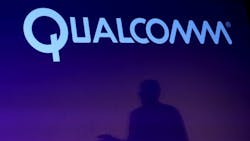Qualcomm Fined $853 Million by South Korean Antitrust Agency
South Korea’s antitrust regulator slapped a record 1.03 trillion won (US$853 million) fine on Qualcomm Inc. (IW 500/45) for violating antitrust laws, the latest in a string of government actions that threaten the U.S. chipmaker’s most profitable business.
The South Korean Fair Trade Commission said Wednesday that the company licensed its key patents only to mobile-phone makers and didn’t properly negotiate the terms of its licenses. The agency also said Qualcomm coerced its customers into signing patent license contracts when selling its chips used in mobile phones in the country, and it didn’t fairly pay for the use of patents held by other phone makers.
The decision from the home country of Samsung Electronics Co. adds to investor concern that the San Diego-based chipmaker, which is also the subject of investigations in the U.S. and Europe, may struggle to defend its lucrative licensing business. Qualcomm gets the majority of profit -- $6.5 billion in its most recent financial year -- from selling the right to use technology that’s fundamental to all modern phone systems.
Qualcomm, calling the decision “unprecedented and insupportable,” said it will appeal the decision in Seoul’s High Court. The KFTC ruling doesn’t go into effect immediately and Qualcomm will seek a stay from the courts while it appeals, said Don Rosenberg, the company’s general counsel.
“The KFTC ruling will not just benefit local handset makers but other global chipset makers too, so today’s ruling from the commission seems a bit broader and stronger than that of China’s last year,” said Jung Dong-joon, a patent lawyer at SU Intellectual Property. “Qualcomm sales accounts for about 20% in the Korean market and that’s a significant market for Qualcomm.”
Lower Rate Possibility?
For Samsung, the world’s biggest phone maker, and LG Electronics Inc., the ruling opens up the possibility they may be able to pay lower rates to Qualcomm. When Qualcomm settled an investigation by Chinese regulators last year, it accepted a lower rate charged on phones sold in that country. Samsung is Qualcomm’s second-largest customer, accounting for about 11% of its sales, according Bloomberg’s supply chain analysis. The U.S. company also designs and sells chips that are the main component in smartphones.
“Qualcomm, a holder of standard-essential patents as well as a monopolistic service provider of modem chips from manufacturing to sales, has violated its agreement to license patents on fair reasonable and non-discriminatory terms, known as FRAND,” the commission said in a statement. Qualcomm offers the rights to use all of its standard-essential patents, some of which cover the core technology behind modern wireless systems, in a combined package. Some of those inventions are used in industry standards.
We’re going to fight this the way we fought all of them. We think we’ll have a much better time with the Korean courts than we had with the Korean Fair Trade Commission."— Don Rosenberg, Qualcomm general counsel
Aside from the fine, the commission wants Qualcomm to let chipset-makers access its key patents, and refrain from imposing unfair conditions on customers when signing contracts. The Korean agency also said Qualcomm should make standard-essential patents available for separate licensing rather than bundling them with chipset sales. And the U.S. company should accord greater value to other companies’ patents when accounting for them in cross-licensing agreements, the commission said.
Qualcomm stock was mostly unchanged in after-hours trade. Samsung was down less than 1% at the close in Seoul, while LG was up 1.2%.
As in other cases that Qualcomm has won, the company expects the courts to side with it because its licensing business follows industry practices that have been in place for decades, Rosenberg said. Profits from licensing fees are crucial to funding its industry-leading research and design efforts and maintaining Qualcomm’s competitive edge.
“We’ve seen time and again that those who actually apply the rule of law to this, come to the conclusion that nothing is wrong,” Rosenberg said. “We’re going to fight this the way we fought all of them. We think we’ll have a much better time with the Korean courts than we had with the Korean Fair Trade Commission. We have a lot of faith in the independence of the courts.”
Discrimatory Charges
In 2009, the commission separately fined Qualcomm 260 billion won for deterring competition through discriminatory charges. KFTC ordered the chipmaker to stop charging higher royalties to customers who buy chips from rivals and to cease offering rebates to handset makers who buy products mainly from Qualcomm. That case is under appeal with the Korean Supreme Court.
The U.S. chipmaker has grappled with regulatory challenges around the world. It was fined $975 million last year by China, ending an inquiry that threatened the U.S. company’s growth in the world’s biggest mobile market.
The European Commission sent antitrust objections to Qualcomm last December, saying the chipmaker had paid “significant amounts” since 2011 to an unidentified major smartphone and tablet manufacturer in return for using Qualcomm’s chipsets exclusively in its products. It may also have sold chipsets below cost from 2009 to 2011 to crush smaller competitor Icera, now owned by Nvidia Corp., the commission added.
Resolving patent wrangles remains key to shoring up Qualcomm’s business. Last month, the chipmaker delivered a sales forecast for the December quarter in line with analysts’ estimates, saying it’s managed to sign technology-licensing agreements with smartphone manufacturers in China that had previously held back payments.
By Jungah Lee and Ian King
About the Author
Bloomberg
Licensed content from Bloomberg, copyright 2016.
